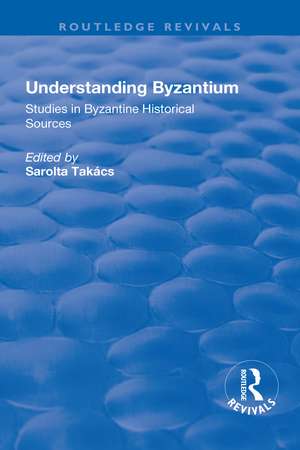Understanding Byzantium: Studies in Byzantine Historical Sources: Routledge Revivals
Autor Paul Specken Limba Engleză Paperback – 11 noi 2019
Din seria Routledge Revivals
- 9%
 Preț: 767.40 lei
Preț: 767.40 lei - 9%
 Preț: 1004.17 lei
Preț: 1004.17 lei - 9%
 Preț: 934.94 lei
Preț: 934.94 lei -
 Preț: 230.80 lei
Preț: 230.80 lei -
 Preț: 294.72 lei
Preț: 294.72 lei -
 Preț: 258.66 lei
Preț: 258.66 lei - 9%
 Preț: 903.41 lei
Preț: 903.41 lei - 18%
 Preț: 695.85 lei
Preț: 695.85 lei -
 Preț: 296.10 lei
Preț: 296.10 lei -
 Preț: 342.36 lei
Preț: 342.36 lei - 9%
 Preț: 606.35 lei
Preț: 606.35 lei -
 Preț: 309.94 lei
Preț: 309.94 lei - 9%
 Preț: 729.99 lei
Preț: 729.99 lei -
 Preț: 256.94 lei
Preț: 256.94 lei -
 Preț: 230.80 lei
Preț: 230.80 lei -
 Preț: 259.47 lei
Preț: 259.47 lei - 9%
 Preț: 903.80 lei
Preț: 903.80 lei -
 Preț: 153.81 lei
Preț: 153.81 lei -
 Preț: 258.66 lei
Preț: 258.66 lei -
 Preț: 294.91 lei
Preț: 294.91 lei -
 Preț: 200.66 lei
Preț: 200.66 lei -
 Preț: 199.85 lei
Preț: 199.85 lei -
 Preț: 308.78 lei
Preț: 308.78 lei -
 Preț: 295.04 lei
Preț: 295.04 lei -
 Preț: 382.23 lei
Preț: 382.23 lei -
 Preț: 258.66 lei
Preț: 258.66 lei -
 Preț: 343.21 lei
Preț: 343.21 lei - 9%
 Preț: 640.90 lei
Preț: 640.90 lei - 9%
 Preț: 605.71 lei
Preț: 605.71 lei -
 Preț: 228.88 lei
Preț: 228.88 lei -
 Preț: 257.67 lei
Preț: 257.67 lei -
 Preț: 245.10 lei
Preț: 245.10 lei -
 Preț: 258.52 lei
Preț: 258.52 lei -
 Preț: 258.66 lei
Preț: 258.66 lei -
 Preț: 368.93 lei
Preț: 368.93 lei -
 Preț: 246.37 lei
Preț: 246.37 lei - 9%
 Preț: 764.34 lei
Preț: 764.34 lei -
 Preț: 258.66 lei
Preț: 258.66 lei -
 Preț: 326.26 lei
Preț: 326.26 lei -
 Preț: 286.98 lei
Preț: 286.98 lei - 8%
 Preț: 418.23 lei
Preț: 418.23 lei - 5%
 Preț: 231.22 lei
Preț: 231.22 lei -
 Preț: 267.15 lei
Preț: 267.15 lei -
 Preț: 295.62 lei
Preț: 295.62 lei - 9%
 Preț: 638.61 lei
Preț: 638.61 lei -
 Preț: 260.85 lei
Preț: 260.85 lei -
 Preț: 341.55 lei
Preț: 341.55 lei -
 Preț: 381.17 lei
Preț: 381.17 lei -
 Preț: 294.53 lei
Preț: 294.53 lei -
 Preț: 294.72 lei
Preț: 294.72 lei
Preț: 218.64 lei
Preț vechi: 259.99 lei
-16% Nou
Puncte Express: 328
Preț estimativ în valută:
41.84€ • 43.23$ • 34.80£
41.84€ • 43.23$ • 34.80£
Carte tipărită la comandă
Livrare economică 19 martie-02 aprilie
Preluare comenzi: 021 569.72.76
Specificații
ISBN-13: 9781138709720
ISBN-10: 1138709727
Pagini: 316
Dimensiuni: 148 x 224 mm
Greutate: 0.58 kg
Ediția:1
Editura: Taylor & Francis
Colecția Routledge
Seria Routledge Revivals
Locul publicării:Oxford, United Kingdom
ISBN-10: 1138709727
Pagini: 316
Dimensiuni: 148 x 224 mm
Greutate: 0.58 kg
Ediția:1
Editura: Taylor & Francis
Colecția Routledge
Seria Routledge Revivals
Locul publicării:Oxford, United Kingdom
Cuprins
Contents: Foreword; Preface; The dating of the so-called Paradeisos; Review of P. Lemerle, Le premier humanisme byzantin. Notes et remarques sur enseignement et culture à Byzance des origines au Xe siècle; The iconoclast iambic verses on the Chalke; Peter of Sicily, his Historia and the Archbishop of Bulgaria; A Byzantine depiction of ancient Athens; Photios on the mosaic in the apse of Hagia Sophia; 'Contributions open to further illuminating discussion'; ’Graphais e glyphais’: on the fragment of Hypatios of Ephesos on images, with an appendix on the Dialogue with a Jew by Leontios of Neapolis; ’Interpolations et non-sens indiscutables’: the first poem of the Ptochoprodromika; Artabasdos, Boniface and the three pallia; Classicism in the 8th century? The homily of Patriarch Germanos on the deliverance of Constantinople; The origins of the Byzantine renaissance; A more charitable verdict: review of N.G. Wilson, Scholars of Byzantium; Further reflections and inquiries on the origins of the Byzantine renaissance, with a supplement: The Trier Ivory and other uncertainties; Interpretation of the Bellum Avaricum and the tomcat ’Mekhlempe’ in three parts; Was bronze a rare metal? The legend of the bull in the Forum Bovis in Parastaseis Ch. 42; Phokas’ raising on the shield; Marginalia to Corippus’ poem In Laudem Iustini Augusti Minoris; How stupid must Zosimos be? Proposals for a new assessment; Badly-ordered thoughts on philhellenism; Index.
Recenzii
’Sarolta Takács, who oversaw the translation and edition of the collection published in the series of the Variorum reprints, justly emphasised the significance of the project introducing thought provoking ideas and original scholarly approach of the German Byzantinist to a new public.’ Revue d’Histoire Ecclésiastique
Descriere
This book was first published in 2003.Paul Speck's work is acknowledged to be of profound importance for the study of the history and culture of the Byzantine world. If at times controversial, it has proved highly influential in terms of the approaches to be taken to historical and literary sources. For many, however, it has remained largely inaccessible in its original German. To help overcome this, the selection of studies presented here have been specially translated into English. Taken together, they make a substantial contribution to a critical understanding of Byzantine writing, and to an interpretation of history free from prejudice and stereotyped conceptions. Their coverage extends from the foundation of Constantinople to current perceptions of Byzantine history, but they focus in particular on the period from the 6th to the 9th centuries - the 'Dark Ages' and the Byzantine renaissance - and the transformation of Byzantium that then took place.
